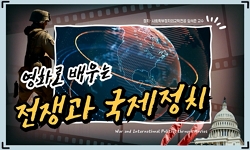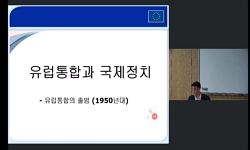This paper focuses on meaning of international politics of the political imagination in the Non-Alignment Movement(NAM). The NAM attempted to present an international political imagination that was distinguished from realism as an alternative at a tim...
http://chineseinput.net/에서 pinyin(병음)방식으로 중국어를 변환할 수 있습니다.
변환된 중국어를 복사하여 사용하시면 됩니다.
- 中文 을 입력하시려면 zhongwen을 입력하시고 space를누르시면됩니다.
- 北京 을 입력하시려면 beijing을 입력하시고 space를 누르시면 됩니다.

냉전기 비동맹 국제정치의 의미와 한계 = The Meaning and Limitations of International Politics in the Non-Alignment Movement during the Cold War
한글로보기https://www.riss.kr/link?id=A107003466
-
저자
김민수 (고려대학교)
- 발행기관
- 학술지명
- 권호사항
-
발행연도
2020
-
작성언어
Korean
-
주제어
비동맹 운동 ; 냉전 ; 국제정치 ; 국민국가 ; 칸트 ; Non-Aligned Movement ; Cold War ; international politics ; nation-state ; Kant
-
등재정보
KCI등재
-
자료형태
학술저널
-
수록면
49-76(28쪽)
-
KCI 피인용횟수
0
- DOI식별코드
- 제공처
-
0
상세조회 -
0
다운로드
부가정보
다국어 초록 (Multilingual Abstract)
This paper focuses on meaning of international politics of the political imagination in the Non-Alignment Movement(NAM). The NAM attempted to present an international political imagination that was distinguished from realism as an alternative at a time when the two superpowers and the international block surrounding them that constituted and enforced the Cold War would not allow any alternatives other than the logic of realist power. The NAM advocated a political neutrality that did not belong to either the East or the West, and at the same time presented a perspective for the international community. Although not established as a single political theory or policy program, it can be viewed as an attempt at a new political imaginary about the unprecedented world order that emerged after the Cold War. In this sense, this paper will examine how the perceptions and political solutions proposed by the NAM differ from other contemporary international political perceptions, and what unique meanings they have. And at the same time, I would like to discover the reason why the NAM no longer developed as the Cold War deepened, not in the external conditions, but in the international political imagination of non-alignment. The international political imagination of the NAM who sought to establish a new international order could not escape the tension inherent in the long-standing modern plan to establish a transnational norm and universal order after the Westphalia system. In particular, the historicality of the Third World, in which the nation-state was supposed to be a bearer of liberation to escape from colonialism and imperialism, had no choice but to intensify the tension between the nation-state and international norms. From this point of view, this paper points out the limitations inherent in the international political imagination of the NAM, and tries to gauge the meaning of a new international political imagination through this.
국문 초록 (Abstract)
본 논문은 비동맹의 정치적 상상이 지니는 여러 의미 중에 특히 국제정치와 관련한 의미에 주목하고자 한다. 비동맹 운동은 냉전을 구성하고 강제하고 있던 두 초강대국과 그들을 둘러싼 국...
본 논문은 비동맹의 정치적 상상이 지니는 여러 의미 중에 특히 국제정치와 관련한 의미에 주목하고자 한다. 비동맹 운동은 냉전을 구성하고 강제하고 있던 두 초강대국과 그들을 둘러싼 국제적 블록이 현실주의적 힘의 논리 이외에는 어떤 대안도 허락하지 않을 것 같았던 시기에 현실주의와 구분되는 국제정치적 상상을 하나의 대안으로 제시하고자 했다. 비동맹 운동은 동・서 어느 한 진영에도 속하지 않는 정치적 중립성을 표방하면서, 동시에 국제사회에 대한 하나의 전망을 제시했다. 비록 하나의 정치 이론이나 정책 프로그램으로 정립되지는 못했지만, 냉전 이후 등장한 전례 없는 세계 질서에 대한 새로운 정치적 상상(imaginary)의 시도로 볼 수 있다. 이러한 의미에서 본 논문은 냉전기 비동맹 운동이 제시했던 국제사회에 대한 인식과 정치적 해법이 동시대의 다른 국제정치적 인식과 어떤 차별성을 지니는지, 그리고 어떤 고유한 의미를 지니는지를 살펴볼 것이다. 그리고 동시에 냉전이 심화되면서 비동맹운동이 더 이상 발전하지 못했던 이유를 외적 조건이 아닌 비동맹의 국제정치적 상상 내부에서 발견하고자 한다. 새로운 국제질서를 확립고자 했던 비동맹의 국제정치적 상상은 베스트팔렌체계 이후 초국가적 규범과 보편적 질서를 구축하고자 하는 오랜 근대적 기획에 내재된 긴장을 벗어나지 못했다. 특히 국민국가가 식민주의와 제국주의의 지배와 억압으로부터 벗어나기 위한 해방의 담지자로 상정될 수밖에 없었던 제 3세계의 역사성은 국민국가와 국제적 규범 사이의 긴장을 심화시킬 수밖에 없었다. 본 논문은 이러한 관점에서 비동맹의 국제정치적 상상에 내재했던 한계를 지적하고, 이를 통해 오늘날 새로운 국제정치적 상상의 의미를 가늠해보고자 한다.
참고문헌 (Reference)
1 김철민, "티토의 외교정책, 비동맹주의(Non-alignment) 수립 배경에 관한 연구" 국제지역연구센터 10 (10): 107-132, 2006
2 김범수, "칸트의 자유 개념과 평화론: 국가의 자유와 국제 공법의 양립 가능성을 중심으로" 한국국제정치학회 59 (59): 7-54, 2019
3 장동진, "칸트와 롤즈의 세계시민주의: 도덕적 기획과 정치적 기획" 한국정치사상학회 9 : 193-220, 2003
4 백원담, "아시아에서 1960-70년대 비동맹/제3세계운동과 민족⋅민중 개념의 창신" 한국중국현대문학학회 (49) : 127-190, 2009
5 김정배, "비동맹운동(Non-Aligned Movement)의 세계사적 위치와 성격" 한국세계문화사학회 (52) : 303-333, 2019
6 서동진, "비동맹 독본" 현실문화 2020
7 김태균, "반둥 이후: 제3세계론의 쇠퇴와 남남협력의 정치세력화" 한국국제정치학회 58 (58): 49-99, 2018
8 여정동, "국제정치와 제 3세계" 나남 1996
9 Vieira, Marco A., "Understanding resilience in international relations: The non-aligned movement and ontological security" 18 (18): 290-311, 2016
10 Rothstein, Robert L., "The weak in the world of the strong: the developing countries in the international system" Columbia University Press 1977
1 김철민, "티토의 외교정책, 비동맹주의(Non-alignment) 수립 배경에 관한 연구" 국제지역연구센터 10 (10): 107-132, 2006
2 김범수, "칸트의 자유 개념과 평화론: 국가의 자유와 국제 공법의 양립 가능성을 중심으로" 한국국제정치학회 59 (59): 7-54, 2019
3 장동진, "칸트와 롤즈의 세계시민주의: 도덕적 기획과 정치적 기획" 한국정치사상학회 9 : 193-220, 2003
4 백원담, "아시아에서 1960-70년대 비동맹/제3세계운동과 민족⋅민중 개념의 창신" 한국중국현대문학학회 (49) : 127-190, 2009
5 김정배, "비동맹운동(Non-Aligned Movement)의 세계사적 위치와 성격" 한국세계문화사학회 (52) : 303-333, 2019
6 서동진, "비동맹 독본" 현실문화 2020
7 김태균, "반둥 이후: 제3세계론의 쇠퇴와 남남협력의 정치세력화" 한국국제정치학회 58 (58): 49-99, 2018
8 여정동, "국제정치와 제 3세계" 나남 1996
9 Vieira, Marco A., "Understanding resilience in international relations: The non-aligned movement and ontological security" 18 (18): 290-311, 2016
10 Rothstein, Robert L., "The weak in the world of the strong: the developing countries in the international system" Columbia University Press 1977
11 Benhabib, Seyla, "The rights of others: Aliens, residents, and citizens" Cambridge University Press 2004
12 Miskovic, Natasa, "The non-aligned movement and the cold war: Delhi-Bandung-belgrade" Routledge 2014
13 Graham, John A., "The non-aligned movement after the Havana Summit" 34 (34): 153-160, 1980
14 Wallerstein, I, "The Politics of the World-Economy: The State, the Movement and the Civilizations" Cambridge University Press 1984
15 Bandyopadhyaya, Jayantanuja, "The Non-aligned Movement and International Relations" 33 (33): 1977
16 Lüthi, Lorenz M., "The Non-Aligned Movement and the Cold War, 1961–1973" 18 (18): 98-147, 2016
17 Rawls, John, "The Law of Peoples" Harvard University Press 1999
18 Armstrong, David, "The Evolution of International Society" The Globalization of World Politics 2014
19 Prashad, Vijay, "The Darker Nations: A People's History of the Third World" New Press 2008
20 Arnold, Guy, "The A to Z of the Non-aligned Movement and Third World. Vol. 172" Scarecrow Press 2010
21 Ticker, Arlene, "Seeing IR Differently : Notes from the Third World" 32 (32): 295-324, 2003
22 Kant, I., "Perpetual Peace" Liberal Arts Press 1957
23 Derria, J., "Of Hospitality(Cultural Memory In The Present)" Stanford University Press 2000
24 Rajan, Mannaraswamighala Sreeranga, "Non-Alignment : The Dichotomy Between Theory and Practice in Perspective" 36 (36): 43-67, 1980
25 Sen, Panchali, "Non-Aligned Movement And The New World Order" 9 (9): 133-150, 2005
26 Bott, Sandra, "Neutrality and Neutralism in the Global Cold War: The Non-aligned Movement in the East-West Conflict" Routledge 2015
27 Lee, Christopher J., "Making a world after empire: The Bandung moment and its political afterlives" Ohio University Press 2010
28 Sleat, Matt, "Legitimacy in Realist Thought : Between Moralism and Realpolitik" 42 (42): 314-337, 2014
29 Neuman, Stephanie G, "International relations theory and the Third World" St. Martins’s Press 1998
30 Hoffmann, Stanley, "International Theory: Critical Investigation" Palgrave Macmillan 212-241, 1995
31 Bull, Hedley, "International Theory: Critical Investigation" Palgrave Macmillan 181-211, 1995
32 Banerji, Malabika, "Institutionalization of the Non-Aligned Movement" 20 (20): 549-563, 1981
33 Keal, Paul, "European conquest and the rights of indigenous peoples: The moral backwardness of international society. Vol. 92" Cambridge University Press 2003
34 Bernstein, A. R., "Encyclopedia of Global Justice" Springer 2011
35 Jackson, Robert, "Classical and modern thought on international relations: from anarchy to cosmopolis" Springer 2005
36 Wight, Martin, "An Anatomy of International Thought" 13 (13): 221-227, 1987
37 Durfey, R. W., "Alliances and American Foreign Policy" 22 (22): 16-, 1969
동일학술지(권/호) 다른 논문
-
중국의 우라늄 광상 탐사와 개발 소론, 1943-1960
- 성신여자대학교 인문과학연구소
- 채준형
- 2020
- KCI등재
-
- 성신여자대학교 인문과학연구소
- 장진호
- 2020
- KCI등재
-
- 성신여자대학교 인문과학연구소
- 문상명
- 2020
- KCI등재
-
고전서사 연구에서 연결성에 대한 논의의 현단계― 고전소설의 디지털 인문학적 연구 사례 검토를 중심으로 ―
- 성신여자대학교 인문과학연구소
- 김나영
- 2020
- KCI등재
분석정보
인용정보 인용지수 설명보기
학술지 이력
| 연월일 | 이력구분 | 이력상세 | 등재구분 |
|---|---|---|---|
| 2028 | 평가예정 | 재인증평가 신청대상 (재인증) | |
| 2022-01-01 | 평가 | 등재학술지 유지 (재인증) |  |
| 2019-01-01 | 평가 | 등재학술지 선정 (계속평가) |  |
| 2018-01-01 | 평가 | 등재후보학술지 유지 (계속평가) |  |
| 2017-01-01 | 평가 | 등재후보학술지 유지 (계속평가) |  |
| 2016-01-01 | 평가 | 등재후보학술지 유지 (계속평가) |  |
| 2015-01-01 | 평가 | 등재후보학술지 유지 (계속평가) |  |
| 2013-01-01 | 평가 | 등재후보학술지 유지 (기타) |  |
| 2012-01-01 | 평가 | 등재후보학술지 유지 (기타) |  |
| 2011-01-01 | 평가 | 등재후보학술지 유지 (등재후보1차) |  |
| 2009-01-01 | 평가 | 등재후보학술지 선정 (신규평가) |  |
학술지 인용정보
| 기준연도 | WOS-KCI 통합IF(2년) | KCIF(2년) | KCIF(3년) |
|---|---|---|---|
| 2016 | 0.32 | 0.32 | 0.33 |
| KCIF(4년) | KCIF(5년) | 중심성지수(3년) | 즉시성지수 |
| 0.46 | 0.49 | 0.732 | 0.5 |




 KISS
KISS






